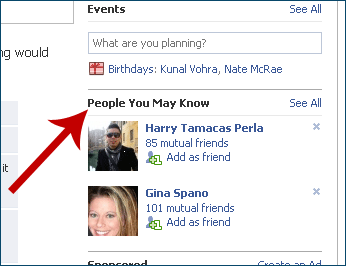
If they know you are poking around, this could lead to an awkward conversation. Perhaps you’ve lost touch with a relative and what to see what they’ve been up to recently? While some reasons you want to look someone up privately may be nefarious, most are very innocent.
#Facebook people you may know based on profile visits update
I have reached out to Facebook for comment on how their 'People You May Know' section works and will update if I get a response.What happens when you go poking around on Facebook? Just be sure to write a long, rambling Facebook post about it first. It's a weird, over-connected creepy world and you are welcome to jump off the train and quit social media at any point. All Facebook cares about is how many ads it can serve to your network. It doesn't care about your past relationships or restraining orders. The bottom line is that we're the product, and Facebook is doing whatever it can to gather as many of us together as possible. There is no such thing as privacy in the social media world. Who are all these people? Do we really know these people that Facebook is suggesting we become such great friends with? Or should we fall in line and add all these creepers, pack them in a restricted list and go about our day? While Facebook is trying to load up your network similar to that of Linkedin (really, how many connections on Linkedin do you really know on a personal level), it is treading heavily on what we think we know about privacy. These caveats might produce a number much bigger than 150, and depends on our long term memory. That is, the number of people we keep some sort of social contact with but does not include those we know personally with a dead social relationship (such as childhood friends we no longer have any contact with), or people we might know casually but don’t maintain a social relationship. I'm going to quote myself in an article again, deal with it.ĭunbar's number is a cognitive theory that states that we can only maintain 150 'friendships' in social relationships. I once wrote about the meaning of friends in the social media age, citing Dunbar's number. Regardless of whom is being suggested or how anyone can even, how can all of these people possibly be considered "friends?" "A bunch of recruiters I've used in the past, along with long forgotten co-workers from years ago with no mutual friends have been showing up all week. "Facebook is doing something with the 'people you may know' feature that's bizarre and stalkerish," another area user told me. Now mailbox fire guy is in your suggested friends list. For instance: perhaps you worked at the same place as one of your friends, and one of their friends worked with them at a different place and that friend went to school with the guy who set fire to your mailbox. It seems Facebook is drawing parallels and guessing based on some deep commonalities below the surface. The 'People You May Know' section has become a dredge through the muddied rivers of our pasts, with no warning whatsoever. It's unsettling to imagine that this is happening with many users, some maybe faced with something worse than just 'scary.' That same area user then had a very profound thought, "what if Facebook is suggesting people that are actively searching for you - whether they be long lost relatives or straight up stalkers?" There's no contact information in my phone or shared friends with said entity." I pressed for any commonalities and there were none, not with email, not with the previous profile - nothing. One area user told me, "this morning Facebook suggested my scary ex out of nowhere. It's like Facebook hired private detectives to dig into our pasts and is suggesting friends based on that, rather than data point commonalities in our profiles.


Some of us live in small towns, some in large cities but the connections Facebook is drawing to some people from us is bordering on stalking.

Yet, something is going on with the way it is suggesting friends as it's a bit too coincidental. So Facebook isn't using location information. We may show you people based on mutual friends, work and education information, networks you are part of, contacts you've imported and other factors." In a statement to the company said, "We're not using location data, such as device location and location information you add to your profile, to suggest people you may know. Quickly after that report was published and social media users started to react negatively, Facebook backed off that statement.


 0 kommentar(er)
0 kommentar(er)
